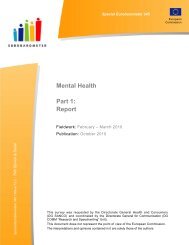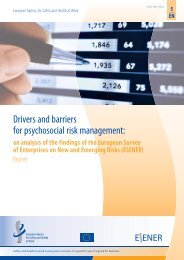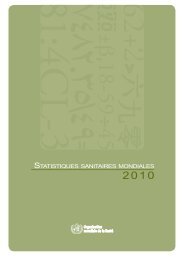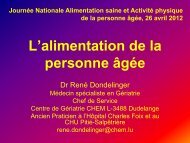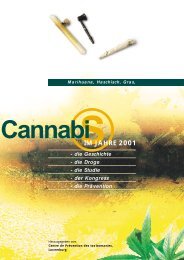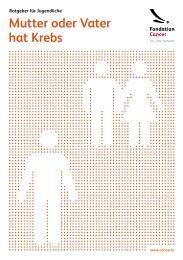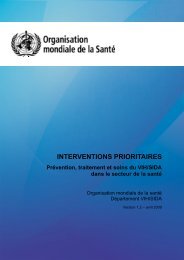healthy and active ageing - EuroHealthNet's Healthy Ageing Website
healthy and active ageing - EuroHealthNet's Healthy Ageing Website
healthy and active ageing - EuroHealthNet's Healthy Ageing Website
Create successful ePaper yourself
Turn your PDF publications into a flip-book with our unique Google optimized e-Paper software.
4. HEALTH PROMOTION FOR 50-60+ YEAR OLDS<br />
While basic principles of health promotion apply to all age groups, there is also a principle that interventions<br />
need to be targeted at <strong>and</strong> developed with the involvement of the specific groups that they aim to benefit,<br />
in order to gain legitimacy <strong>and</strong> ensure appropriateness. The Health Development Agency in the UK, which<br />
developed a programme specifically geared for the needs of this age group, found that those aged 50-65<br />
perceive themselves as a distinct generation with particular preferences. 23<br />
Box 11<br />
Key resource<br />
The report “Taking Action: Improving the health <strong>and</strong> wellbeing of people in mid-life <strong>and</strong> beyond”<br />
(2004) by the Health Development Agency in the UK offers a number of evidence-based recommendations<br />
<strong>and</strong> guidelines for implementing health promoting practices targeted at people between 50 <strong>and</strong> 65. The<br />
recommendations are based on the lessons <strong>and</strong> outcomes of eight pilot projects, <strong>and</strong> highlight key findings<br />
from these. The report also provides practical tools, as it contains a checklist for strategic planning or<br />
service implementation, including points on: developing local knowledge <strong>and</strong> underst<strong>and</strong>ing; developing a<br />
portfolio of services, activities <strong>and</strong> interventions <strong>and</strong> the importance <strong>and</strong> nature of evaluation.<br />
More information is available at:<br />
http://www.nice.org.uk/nicemedia/documents/actionpo.pdf<br />
The programme was based on the recognition that people in their fifties go through many life changes,<br />
involving work, employment, illness, bereavement of parents, children becoming more independent <strong>and</strong><br />
gr<strong>and</strong>parenthood. Such changes precipitate reflection on current <strong>and</strong> future opportunities <strong>and</strong> directions.<br />
In turn, this awareness can make people more receptive to health messages for a more independent<br />
healthier old age. People in this age group want to take control over their health <strong>and</strong> well-being <strong>and</strong> have a<br />
range of opportunities allowing them to do so effectively. This group definitely does not identify themselves<br />
as needing services for ‘older people’. They however feel ‘ignored’ by adult services, as reflected in this<br />
comment:<br />
“I think at my age (55 years) you’re in a group of the forgotten really – you know they do an awful lot for<br />
younger people <strong>and</strong> children <strong>and</strong> once you get over a certain age as a pensioner, then you get a lot more<br />
support. But I think for my age group there’s not a lot going on you know, we’re sort of forgotten really.” 22<br />
Identifying 55-60+ year olds as ‘older people’ can be a barrier to accessing services, <strong>and</strong> any programme<br />
directed at this age group needs to address this. In Canada, for example, despite a varied <strong>and</strong> sophisticated<br />
programme of activities, the Quebec CJCS Centre found it difficult to attract people within this age group, as<br />
there was a stigma that they served much older people. As a result, CJCS decided to tackle its perception<br />
problem <strong>and</strong> specifically reach out to this age group. They did this by developing a new programme to<br />
support those facing the transition to retirement. 24<br />
The Health Development Agency in the UK (see Box 11) defined the principles of underlying health<br />
improvement strategies for people in midlife as the following:<br />
• Maximising engagement through providing a spectrum of services<br />
• Adopting empowerment strategies<br />
• Increasing <strong>and</strong> improving opportunities for social interaction<br />
• Building <strong>and</strong> sustaining relevant <strong>and</strong> effective partnerships<br />
23 Taking Action: improving the health <strong>and</strong> wellbeing of people in mid-life <strong>and</strong> beyond Health Development<br />
Agency (HDA) 2004. http://www.nice.org.uk/niceMedia/documents/actionpo.pdf<br />
24 International Council on Active Aging: http://www.icaa.cc/1-Organizationalmember/member-articles/age50plusnewlifeoptions30.pdf<br />
21



